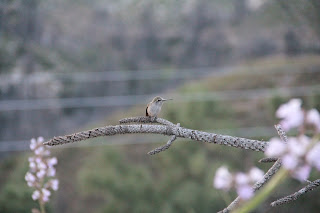This 11-acre blufftop park at the northernmost end of the town of Pismo Beach overlooks the ocean and offshore sea stacks, has benches and viewing platforms, a network of meandering accessible paths, grassy areas, picnic tables, a small amphitheater, and a playground with whale-shaped climbing structures. It is named for a one-time tourist attraction, Dinosaur Caves, which used to offer tours of sea caves carved by waves in the rocks below and featured a statue of a large, headless concrete dinosaur. The statue remained unfinished because neighbors objected, and was demolished in the 1960s. The sea caves collapsed in the 1970s and can now be reached only by kayak.
Wednesday, July 3, 2013
Tuesday, July 2, 2013
Monday, July 1, 2013
Friday, June 28, 2013
Thursday, June 27, 2013
Sun Setting in Angeles Crest
“There's a sunrise and a sunset every single day, and they're absolutely free. Don't miss so many of them.”
― Jo Walton
― Jo Walton
Wednesday, June 26, 2013
Hummingbird's Delight
Hummingbirds are
among the smallest of birds, most species measuring in the 3–5 in. range. They
hover in mid-air by rapidly flapping their wings 12–80 times per second (depending on
the species). They are known as hummingbirds because of the humming sound
created by their beating wings, which sometimes sounds like bees or other
insects. To conserve energy while they sleep or when food is scarce, they have
the ability to go into a hibernation-like state (torpor) where their metabolic
rate is slowed to 1/15th of its normal rate. When
the nights get colder, their body temperature can drop significantly and thus
slow down their heart and breathing rate, thus burning much less energy
overnight. As the day heats back up, the hummingbird's body temperature will
come back up and they resume their normal activity. They can fly
at speeds exceeding 15 m/s (34 mph); they are also the only group of birds with the ability
to fly backwards. Individuals
from some species of hummingbirds weigh less than a penny.
Tuesday, June 25, 2013
Wild Fires to Wild Flowers
The Station Fire on State Route 2 (August 26 – October 16,
2009), 209 structures destroyed, including 89 homes) started in the Angeles
National Forest near the U.S.
Forest Service ranger station on the Angeles
Crest Highway. Two firefighters were killed
on August 30 while attempting to escape the flames when their fire truck
plunged off a cliff. On September 3, officials announced that the
Station Fire was caused by arson and that a homicide investigation
had been initiated because of the death of the firefighters involved.
Investigators discovered a substance at the fire's point of origin which they
believe may have accelerated the flames. At 160,557 acres, the Station
Fire is the 10th largest in modern California history, and the largest
wildfire in the modern history of Los Angeles County, passing the
105,000-acre (164 sq mi) Clampitt Fire of September 1970.
Subscribe to:
Posts (Atom)



















































